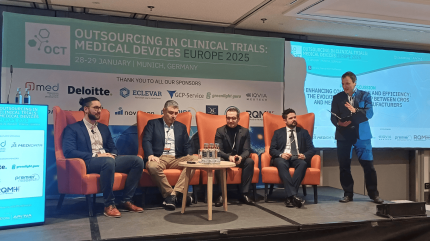
The challenges in meeting regulatory requirements during a clinical investigation often start at the site level, and strong communication and site presence of trial sponsors and clinical research organisations (CRO) are key in ensuring positive outcomes.
Speaking on a panel during the Outsourcing Clinical Trials (OCT) Medical Devices 2025 conference, taking place in Munich, Germany, on 28-29 January, Medaxis’ medical expert Mark Cregan stated that regarding site-level processes during a clinical investigation, regulatory compliance is only as good as the data input.

Discover B2B Marketing That Performs
Combine business intelligence and editorial excellence to reach engaged professionals across 36 leading media platforms.
“If you look at what goes on at the site and what goes into the electronic data capture (EDC) system, the quality of that data, defines all your regulatory compliance, and that really depends upon the sponsor to have a good presence at the site,” he said.
“Data being collected and entered into the EDC may, for example, relate to serious adverse events, and that data is therefore key.
“For me, the key challenge towards data collecting and meeting regulation must be addressed by making sure there is a good representative from the sponsor at the site to make sure the site is well trained and well supported in collecting all the data.”
Fellow panellist Pavel Kusnierik, head of regulatory affairs at biotech Contipro, stated that several factors can jeopardise the end quality of data collected during a clinical investigation and that a CRO should be available to ensure that things go smoothly.

US Tariffs are shifting - will you react or anticipate?
Don’t let policy changes catch you off guard. Stay proactive with real-time data and expert analysis.
By GlobalDataKusnierik said: “I think that a CRO should partner with the sponsor of the clinical investigation, and also support the in the sense that if something is not designed in the right way or not managed correctly, it can be corrected.
“As mentioned, site data collection, done properly, is absolutely key. But also, there are sometimes a number of deviations when you run an investigation.
“For example, maybe patients have been enrolled who fall outside of the inclusion/exclusion criteria, or maybe the data was collected in compliance with the regulation, but the data which was collected for inclusion in the clinical study was not good enough as it may potentially have been jeopardised by other process deficiencies.”
If such deficiencies have resulted in poor quality data, Kusnierik noted that it is important the CRO can guide the sponsor and site in the right way and be bold enough to tell them when they have “made a mess” of a given process important for the collection of sufficient quality data.
He concluded: “It’s not an easy task, because you are in the middle. But you need to think about the patient benefit, and in some cases, this may necessitate a rethink and even a restart of processes to ensure good outcomes for the overall clinical investigation.”





